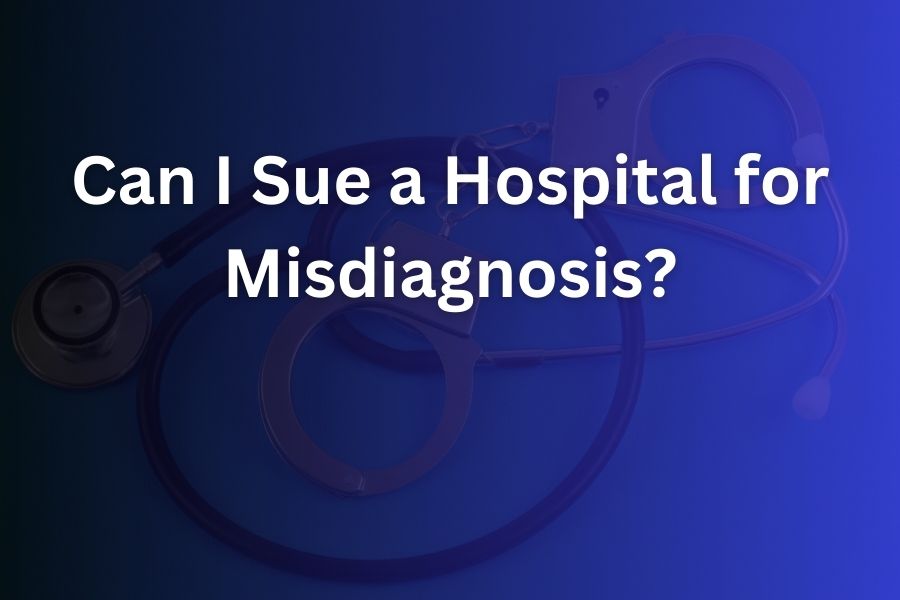
When a hospital fails to diagnose a condition correctly, you may feel lost and hurt. You trusted the medical system and the outcome was worse instead of better. You might wonder if you can hold the hospital responsible.
The answer is yes, you can, under specific conditions, and in this article you will learn what those conditions are, how to build a case, what hurdles you may face and how to protect your rights.
What Is Misdiagnosis in a Hospital Setting
Misdiagnosis means a medical facility identifies the wrong condition, delays the correct diagnosis, or fails to diagnose at all. In a hospital environment, this might happen through misreading test results, failing to consider important symptoms, or breakdowns in communication among staff. Many cases involve emergency rooms, imaging labs, or pathology departments.
When a hospital misdiagnoses you, you may suffer more harm: your condition may worsen, you might endure unnecessary treatments, or you may lose valuable time. In the U.S., misdiagnosis accounts for a substantial share of medical malpractice claims.
Can You Sue a Hospital for Misdiagnosis?
Yes, you can sue a hospital for misdiagnosis — but only when you can show that the misdiagnosis resulted from negligence and caused you real harm. You must establish several legal elements to proceed. A hospital is not automatically liable just because you received a wrong diagnosis.
Key Elements You Must Prove
You will need to demonstrate the following four elements:
- Duty – The hospital or one of its providers owed you a duty of care. You had a patient-provider relationship.
- Breach of Duty – The hospital or its staff failed to act in accordance with the accepted medical standard of care for your condition.
- Causation – The breach of duty directly caused your injury or worsened your condition.
- Damages – You suffered measurable harm such as additional medical costs, lost wages, pain or reduced quality of life because of the misdiagnosis.
Without proof of all four, your case may not succeed.
How Hospital Liability Differs from Physician Liability
When you sue solely a doctor you saw, you hold that individual provider responsible. When you sue a hospital, additional issues govern liability. For example:
- If the misdiagnosis occurred because a hospital employee (like a lab technician or nurse) did not follow protocol, the hospital may be liable indirectly (vicarious liability)
- If the hospital did not maintain adequate systems or staff training, that may create direct hospital liability (corporate negligence)
- If the diagnosing doctor is an independent contractor, the hospital might escape liability unless it failed in oversight.
So you must carefully evaluate who acted, what their role was, and whether the hospital’s own policies or systems failed you.
Steps You Should Take If You Suspect You Were Misdiagnosed
Start promptly. Here are the steps you should follow:
- Seek a second opinion from another qualified physician to confirm the correct diagnosis and document the difference.
- Preserve all medical records, test results, imaging studies, hospital admission notes, and communications.
- Do not delay in contacting an experienced medical-malpractice attorney who knows hospital misdiagnosis cases.
- Be aware of the statute of limitations in your state. Many states give two to three years from the discovery of harm to file a lawsuit.
- Avoid signing hospital or insurance documents without legal advice.
What Factors Strengthen Your Case
Your claim will improve if you can show:
- A clear connection between the misdiagnosis and your harm (for example a treatable disease worsened because of the delay)
- That a reasonable hospital in similar circumstances would have acted differently (expert testimony)
- Good documentation of your condition, diagnosis, and the hospital’s decisions
- That you sought care or followed hospital recommendations and still suffered harm
What Hurdles You May Face
Hospital misdiagnosis cases often have obstacles:
- Medicine involves uncertainty. A wrong diagnosis alone does not prove negligence unless standards were breached.
- Establishing causation in misdiagnosis cases can be complex—showing the wrong diagnosis caused worse outcomes can require detailed expert evidence
- Hospitals and insurers often have large resources to defend claims
- Damages caps or special procedural rules may apply depending on your state
Recent Trends and Statistics
Misdiagnosis is common. Studies show that failure to diagnose or delayed diagnosis represents a significant portion of medical-error claims. While exact numbers vary by state, patients should assume the risk is real and measurable. For example, one law-firm resource noted that misdiagnosis claims are one of the most frequent medical-malpractice categories.
Damages: What You Can Recover
If you win a misdiagnosis lawsuit against a hospital you may recover:
- Economic losses: past and future medical bills, lost wages, reduced earning capacity
- Non-economic losses: pain and suffering, emotional distress, loss of companionship
Some states place caps on non-economic damages, so check local law.
State Differences You Must Know
Each state sets its own rules for medical-malpractice claims. Things that vary include:
- Statute of limitations (for example, in New York the period can be 2.5 years from discovery)
- Notice requirements (some states require you notify the hospital in writing before you sue)
- Damage caps or special immunity for certain providers
- Requirements for expert affidavits or certificates before filing
When the Hospital May Not Be Liable
You may not have a viable case if:
- The diagnosing physician was an independent contractor and the hospital did not control the care
- You can’t show a breach of standard of care (i.e., the misdiagnosis may have been a known risk)
- You cannot prove causation—that the misdiagnosis caused your harm
- The statute of limitations period has expired without valid extension
Common Misdiagnosis Scenarios in Hospitals
In hospital settings these are frequent:
- Emergency-room delayed diagnosis of a dangerous condition like stroke or sepsis
- Lab or radiology errors that result in a wrong or missed diagnosis
- Failure to follow up on abnormal test results
- Miscommunication among hospital staff about diagnostic findings
- Systemic failures such as understaffed units or faulty equipment
How to Choose the Right Attorney
Look for a law firm that:
- Has experience handling hospital misdiagnosis and medical-malpractice cases
- Understands hospital systems and how diagnostic chains operate
- Can obtain expert medical testimony to establish standard of care and causation
- Works on a contingency-fee basis (no payment unless you recover)
Starting with a free consultation can help you assess whether you have a strong case.
When to Settle vs. Go to Trial
Many hospital misdiagnosis cases settle out of court. Key points to consider:
- Settlement offers often depend on the strength of your documentation and expert support
- Going to trial can yield higher compensation but also involves higher risk and longer time
- Your attorney will evaluate whether the hospital’s offer reflects your probable outcome at trial and your tolerance for risk
Your Role as a Patient and Advocate
You play an active role:
- Ask questions if your diagnosis does not align with your symptoms
- Request a second opinion when things don’t add up
- Keep clear records of your symptoms, treatments, and communications
- Be proactive about follow-up care and monitoring
These steps help protect your health and strengthen your legal position if needed.
Conclusion
If you believe a hospital misdiagnosed you, yes, you may sue—but you must act quickly, gather reliable evidence, and demonstrate negligence, causation, and harm.
With strong documentation and the right legal team you can hold a hospital accountable for failures in diagnosis. You deserve accurate medical care and fair redress when things go wrong.
Frequently Asked Questions (FAQs)
- Can I sue a hospital if the doctor was an independent contractor?
Yes, but it is harder. The hospital must have some liability—such as failing to supervise, hiring negligently, or retaining a provider with known problems. If the doctor was truly independent and the hospital had no control, liability may fall only on the physician. - How long do I have to sue a hospital for misdiagnosis?
It depends on your state. Many states give two to three years from when you discovered or should have discovered the misdiagnosis. Some states require notice before you file. Always check local statutes of limitations. - Is a wrong diagnosis always medical malpractice?
No, not always. Medicine involves risk and uncertainty. You must show the hospital’s care fell below the standard of care and that the error caused your harm. A misdiagnosis alone is not enough. - What kind of proof do I need?
You need documentation of your condition and symptoms, test results, hospital records, expert testimony that the care was substandard, proof of harm and financial losses. The stronger your records and expert support, the stronger your case. - Can a hospital be held responsible for a delayed diagnosis?
Yes. If the delay resulted from hospital staff failing to follow accepted protocols, misreading tests, or failing to act on abnormal results, the hospital may be liable if the delay caused harm. - Are there damage caps for hospital misdiagnosis claims?
In some states yes. Many states impose limits on non-economic damages like pain and suffering. Economic losses like medical bills are generally fully recoverable. Check your state’s rules. - What’s my first step if I think I was misdiagnosed?
First seek a second opinion to confirm your condition. Then gather all medical records and consult a qualified medical-malpractice attorney as soon as possible to assess your rights and deadlines.
